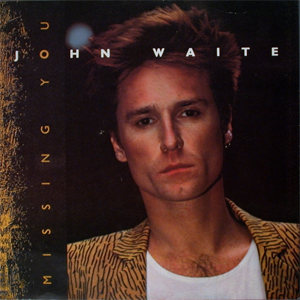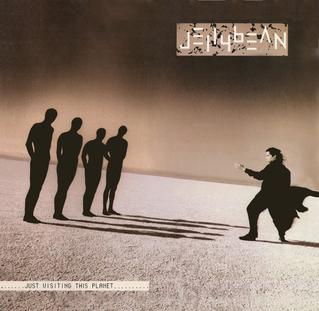
John Charles Waite is a British rock singer and musician. As a solo artist, he has released ten studio albums and is best known for the 1984 hit single "Missing You", which reached No. 1 on the US Billboard Hot 100 and the top ten on the UK Singles Chart. He was also the lead vocalist for the successful rock bands The Babys and Bad English.

"Love Will Save the Day" is a song recorded by American singer Whitney Houston from her second multi-platinum studio album Whitney (1987). The song was released on July 5, 1988 by Arista Records as the album's fifth single. The song did not have a music video but still was successful, climbing into the US Top Ten. "Love Will Save the Day" is the fastest-tempoed song on the album Whitney. Written by Toni C, produced by John "Jellybean" Benitez, it is one of the uptempo singles on the album that also included "I Wanna Dance with Somebody " and "So Emotional."

Pandemonium is the fourth studio album by American band The Time released in 1990. Much like the three previous albums, the album consists of music in the funk rock genre, although this album breaks the Time's six-song album tradition. The album is a tie-in with the film Graffiti Bridge, and several songs from the album appear in the film.

"Spotlight" is a song by American singer Madonna from her first remix album You Can Dance (1987). It was released as a single in Japan on April 25, 1988 by Sire Records and Warner-Pioneer Japan. Initially rejected during her True Blue album recording sessions, the song was written by Madonna, Stephen Bray and Curtis Hudson who had presented the original to the singer. The song was remixed by John "Jellybean" Benitez.

"Fascination Street" is a song by English rock band the Cure from their eighth studio album, Disintegration (1989). It was issued as a single only in North America, as the band's American record company refused to release the band's original choice, "Lullaby", as the first single. The song became the band's first number-one single on the US Billboard then-newly created Modern Rock Tracks chart, staying on top for seven weeks.

"Sidewalk Talk" is a song by American record producer John "Jellybean" Benitez from his first extended play, Wotupski!?! (1984). It was released on October 21, 1984, by EMI Records as the first single from the EP. The song was written by Madonna and produced by Benitez. They had initially met in 1983 and Benitez worked as a producer on Madonna's self-titled debut album. When he started work on his debut EP, Wotupski!?!, Madonna wrote "Sidewalk Talk" for him. The song features bass and electric guitars, synthesizers, piano, and drums. Lead vocals are by Catherine Buchanan with additional chorus vocals by Madonna.

"Missing You" is a song co-written and recorded by English musician John Waite. It was released in June 1984 as the lead single from his second album, No Brakes (1984). It reached number one on Billboard's Album Rock Tracks and on the Hot 100, as well as number 9 on the UK Singles Chart. "Missing You" was the only record in 1984 to spend only a single week at the top of the Hot 100. The song was nominated for the 1985 Best Pop Vocal Performance Male Grammy Award.

"It's a Sin" is a song by English synth-pop duo Pet Shop Boys from their second studio album, Actually (1987). Written by Chris Lowe and Neil Tennant, the song was released on 15 June 1987 as the album's lead single. It became the duo's second number-one single on the UK Singles Chart, spending three weeks atop the chart. Additionally, the single topped the charts in Austria, Denmark, Finland, Germany, Ireland, Norway, Portugal, Spain, Sweden and Switzerland, while reaching number nine on the US Billboard Hot 100.

"If You Love Somebody Set Them Free" is the first single by English musician Sting from his solo debut album, The Dream of the Blue Turtles (1985). It is also the opening track of the album, and is featured on Fields of Gold: The Best of Sting 1984–1994 as well as The Very Best of Sting & The Police.

Three Hearts in the Happy Ending Machine is a 1986 solo album by Daryl Hall. The album features his only top-ten solo single, "Dreamtime", which peaked at number five on the Billboard Hot 100. The second single, "Foolish Pride", peaked at number 33.

"Eyes" is a song by American pop singer Donna Summer, released as the third and final single from her twelfth studio album Cats Without Claws (1984). The song as written by Summer and Michael Omartian and produced by the latter. It was released in May 1985 by Warner Bros. Records (UK). Edited in length from the original version on the album and remixed by John "Jellybean" Benitez, the single peaked at No. 97 for one week in the UK Singles Chart.

"Criticize" is a song by American recording artist Alexander O'Neal, written by O'Neal and Jellybean Johnson. It was the second single from O'Neal's second solo album, Hearsay (1987). The song's distinctive backing vocals were performed by Lisa Keith. Following the successful chart performances of the Hearsay single "Fake", "Criticize" was released as the album's second single.

"I.O.U." is a song by British musical group Freeez, released in 1983. The song was written and produced by Arthur Baker and remixed by Jellybean Benitez and Arthur Baker. The song was an international hit, reaching number two on the UK Singles Chart and topping the US Billboard Dance/Disco Top 80 chart, giving Freeez their only chart-topping single on any Billboard chart. It was the 18th-best-selling single of 1983 in the United Kingdom.

No Brakes is the second solo album by British musician John Waite, released in 1984. It features Waite's biggest hit single "Missing You" which hit number 1 on the US Billboard's Album Rock Tracks and the Billboard Hot 100. No Brakes was certified Gold in September 1984 – three weeks prior to breaking into the Top 10 of Billboard's album chart.

"I Can Dream About You" is a song written and performed by American singer Dan Hartman on the soundtrack album of the film Streets of Fire. Released in 1984 as a single from the soundtrack, and included on Hartman's album I Can Dream About You, it reached number 6 on the Billboard Hot 100.

Mask of Smiles is the third solo album by British rock singer-songwriter John Waite. It was released in mid-1985. The previous year, Waite's "Missing You" was a No. 1 hit.

"Jody" is a song by American singer Jermaine Stewart, released in 1986 as the third single from his album Frantic Romantic. It was written by Stewart, Narada Michael Walden and Jeffrey Cohen, and produced by Walden.

Rover's Return is the fourth studio album from English musician John Waite, which was released by EMI in 1987.

Just Visiting This Planet is the second album by Jellybean, the nickname for American producer, remixer and songwriter John Benitez. The album was released in 1987 and contains the singles "Who Found Who", "The Real Thing", "Jingo" and "Just a Mirage".

"Don't Lose Any Sleep" is a song by English musician John Waite, which was released in 1987 as the second and final single from his fourth studio album Rover's Return. The song was written by Diane Warren, and produced by Frank Filipetti, Rick Nowels and Waite. "Don't Lose Any Sleep" peaked at No. 81 on the US Billboard Hot 100 and remained in the charts for four weeks.


















